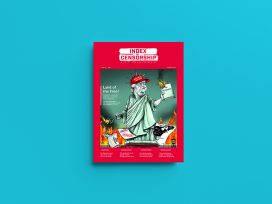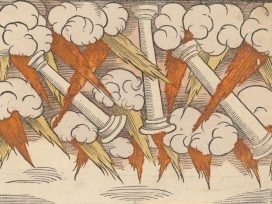Adam Reichardt, editor-in-chief of New Eastern Europe, interviews historian Claire Potter about her opinions on how the US election went and what this might mean for US democracy.
Adam Reichardt: I would like to start with a quote from your book Political Junkies, published in 2020. Following the results of the 2016 election, when Donald Trump first won, you wrote: ‘When the dust settled on 9 November 2016, a nation of political junkies was exhausted. The mainstream media were in shock and democracy seems to be broken beyond repair.’ Would you say the same thing now after the 2024 win, or is there something different in your opinion when you reflect on these two victories?
Claire Potter: I would say one of the things that’s very different in 2024 is that we’ve seen this all before. In a sense, the Trump presidency never ended – even though Joe Biden was president between 2020 and 2024. I say that because Trump ran a sort of presidency in exile. There were Americans all over the country who supported him and believed that he was still president. And then there were all of us who knew that he wasn’t, but we couldn’t get him out of our consciousness. Usually when a president is defeated, they find something else to do: they go home; they start a presidential library; they do something very conventional, leaving public life behind. Donald Trump never did that. Of course, it’s very consistent with his personality; he has always been in public life in some way or another. Why would he go?
But I think the other familiar sensation is that election night 2024 felt like 2016 déjà vu for me: that sinking feeling of like, oh, this isn’t going well. We thought that a reasonable, intelligent candidate would defeat someone who’s incoherent and elderly. This time, however, I think Democratic voters were certainly distressed that this was wrong, and then most people I know recovered quickly. It’s not that we’re any less apprehensive or any less anxious, but we are also familiar with what happens next, and we know how to prepare ourselves.
Another thing that is different is the fact that the media were fundamentally changed by his first presidency, to the extent that media were prepared to really back off from substantive criticism of the Trump campaign. They would profess themselves to be shocked. They would profess themselves to live in a world where the boundaries are being broken all the time, etc. Yet, two major newspapers in the US did not endorse a presidential candidate this year. And that is a significant sign of the way in which major media organizations both know that they profit off a Trump presidency and are also unwilling to test the possibility that Trump will break the norms even further and go after them for being critical of him.
The Washington Post and the Los Angeles Times are both owned by billionaires, who swooped in to save economically vulnerable publications. Basically, all newspapers are economically vulnerable at this point. Initially, people thought these billionaires had finally figured out what they could do with their money: provide a public service. It wasn’t until those publishers pulled their endorsements, which in both cases had already been written and decided upon by the editorial boards, that their readers responded with a kind of shock – the billionaires are supporting the billionaire! I think it was yet another step in the liberal audience’s erosion of trust in the media.
Adam Reichardt: I want to come back to this topic of media, but first I’d like to follow up on this quote from your book where you also mentioned that American democracy appeared to be broken beyond repair. Do you think that we are still in this situation? And, if yes, is it unfixable? Can we say that the democracy of the US today is unrecognizable from previous generations?
Claire Potter: First, any historian would tell you that while there are democratic principles that have been uniformly in place since the eighteenth century, in fact, they have been enacted very differently over time. We have the same constitution now as we did when slavery was permitted, women couldn’t vote, and so on. We have amended and massaged that constitution over time in the name of perfecting democracy. In reality, ideas about what democracy is have changed dramatically over the past 250 years. Very few people believed that democracy required the participation of African American people, the large majority of whom were enslaved until 1864 or 1865. That requires a change in your idea of what democracy is. And that model of democracy then became the object of struggle after 1865 to produce women’s suffrage in 1919, and then universal African American suffrage by the 1960s. That’s a long struggle and a really long period of transformation.
Where I think 2016 seemed different is that the rules were broken so quickly and various kinds of what we might call ‘gentlemen’s agreements’ vanished. The idea that men who were not just sexually inappropriate and sexually violent towards women, which Trump is, but that men who were lewd with messy personal lives could be elect as president didn’t happen until the 1990s. One could say Bill Clinton started the process of getting the electorate used to the idea that men who are openly accused of straying outside their marriage and sexually assaulting other women can be president. But it wasn’t until Trump showed up and said ‘this is who I am, take it or leave it’ that the norm vanished. That triggered a whole series of abrupt changes in the 2016 election cycle and beyond, which caused many Americans to believe democracy had been corrupted beyond repair.
What we have seen in 2020 and 2024 is that the people who voted for Trump in 2016, voted for him in increasing numbers over the following eight years. What liberals like me thought was a complete aberration in the American choice of a president, can no longer be considered an aberration if it’s still going on eight years later and more and more people of a diverse electorate are joining that group.
Adam Reichardt: You mentioned the support growing for Trump over these past eight years. Yet in the weeks and days ahead of the election, opinion polls showed that the race was neck and neck, and in some swing states even Harris was slightly ahead. Why do you think the polls were off in this election?
Claire Potter: That’s a very good question because, in fact, it is beginning to look like the polls were not that far off, and that the Harris campaign’s internal polling never put her ahead. The Cook Political Report has recently put out numbers that Trump has fallen below the 50 percent margin: that he’s at 49.87 percent and Harris is at 48.25. As they clean up the final numbers from uncounted votes in California, it is likely to bring Harris even closer.
So, in fact, the election was neck and neck, but there are a couple of things that are worth thinking about. First, nobody took the Trump voter mobilization operation seriously, including me. It was outsourced to Turning Point USA. Charlie Kirk is a notoriously cavalier person who has built this empire around young conservative men. Then, Elon Musk hired a whole bunch of other people to do canvassing. This really isn’t how it is normally done. Many analysts looked at this and said that it is never going to work. But it did and better than the Democrats’ traditional volunteer model. In retrospect, the Trump campaign and their strategy was getting people to vote who normally do not vote, which is what they also did in 2016. It worked.
And this affected polling: infrequent and first-time voters are very difficult to poll because you can’t find them. They’re not on all the lists. Someone like me, who votes in absolutely every election, is on all the lists to be called for opinion polling. But somebody who either hasn’t voted in five or six years or somebody who moves around a lot are just notoriously difficult to poll because they’re difficult to pin down. Nevertheless, the polls turned out to be pretty accurate.
Adam Reichardt: It begs the question as to whether his victory was related to the way that he addressed people, with his controversial, polarizing, sometimes incoherent language; or maybe actually despite it? That he actually somehow appealed to voters based on issues?
Claire Potter: Yes and no. James Carville, Bill Clinton’s adviser, said it back in 1992: ‘It’s the economy stupid’. I think there are a lot of people in the US for whom the low unemployment figures and the fairly decent stock market makes no difference, because how they are getting along is by working somewhere between two and four jobs per family. Adults very often have two jobs. For example, they have a job as a public-school teacher, which makes very little money. And then they do some kind of gig work, like driving an Uber on the weekends. When I was in Nashville last summer I was taking Ubers all over the place, and probably seven out of ten of my drivers were state school teachers working over the summer and on the weekends.
It is very expensive now to live in the US and people are only keeping up by going into debt and by working multiple jobs. When people say it’s the economy, what they are saying is ‘I’m not doing well’ and ‘eggs are up to five dollars a dozen’. Professional people are graduating with tens of thousands of dollars of education debt. American voters tend to say, ‘I’m not doing well, let’s try someone else.’
Adam Reichardt: It can’t get worse, right?
Claire Potter: Yeah – at least they think it can’t get worse. But if Trump does implement these tariffs, it will. And we should remember, most Americans pay a lot of attention to their household budget, and very little attention to the complexities of politics or to politicians. When Kamala Harris announced her candidacy, two-thirds of Americans had no idea who she was. So, it’s a combination of people being disconnected from politics, people being tied into media outlets that are very personalized and often more about culture and ranting than about conveying information. But it’s also about people working really hard and simply not paying attention to what’s going on.
Adam Reichardt: I’m really curious about your thoughts and reflections on the role of social media during the election, especially on the role of Elon Musk and his platform X (previously Twitter). The last time Trump was elected, there was no doubt his personal Twitter profile played a role, but I think something has changed in the whole infosphere since. What is your take on this changing political information environment? Is it becoming influencer and social-media driven? There was a new Pew Research Center report that came out that said 20% of Americans regularly get their news from influencers on social media.
Claire Potter: I think this is related to something that Alexandria Ocasio-Cortez, a congresswoman from New York City, said recently. People generally don’t trust the media to be truthful. They only value information they’re getting from particular people who they trust. Ocasio-Cortez spoke to those who had voted for her, a socialist, and also for Donald Trump – yes, there’s a whole category of people who did that. She asked why they voted for both of them. They said, ‘I trust you and I trust him.’ They’re not thinking about ideology. They see somebody who they feel that they know intimately, who tells them the truth.
Of course, nobody tells the truth all the time, and Donald Trump tells the truth dramatically less than other people. But there is a desire that Americans have which has become part of the social media infrastructure and its business model: to lock on to one influencer and learn everything from them. Trump voters like my brother-in-law watch YouTube videos of these influencers, who he believes will tell him everything he needs to know. Sometimes what they are telling him is completely false. Sometimes it’s a sort of bizarre take on something that’s true. But what matters is that he doesn’t think there is such a thing as a trustworthy mainstream media source. And he doesn’t consider Fox New is mainstream media, because they have combined the influencer model with the news model.
Adam Reichardt: What do you think is next for mainstream media? Are they going to go through some sort of soul-searching process? Or are they going to follow these trends of becoming more like influencers like Fox News has already done?
Claire Potter: Mainstream media is showing absolutely no signs of having any kind of capacity for critical thought about how they have driven this moment in American politics. I don’t think I’ve watched a traditional TV channel in years; a lot of people have stopped watching cable TV and I think this accelerated in the last three or four years. But I would say that mainstream media seems baffled. After almost a decade of this you still see columns about how they don’t know how to cover Trump.
Adam Reichardt: What about your take on Elon Musk himself? Has he become not only the richest person but also one of the most powerful people politically in the world?
Claire Potter: He certainly is the richest person. He certainly has a lot of influence where he should never have had it. The fact that he was able to develop Starlink as a private entrepreneur and that system is not owned by the US government is possibly one of the greatest strategic errors in American history. He can just say, ‘I’m shutting Starlink off over this area that the Ukrainians might be attacking, don’t worry about it, Vladimir.’ And of course, he’s not bound by a lot of the conventions that anybody who’s officially in the government is bound by.
That said, the power Musk has in a new Trump administration depends on whether he and Trump continue to get along. The honeymoon can’t last much longer. They’re both men with phenomenal egos. And Elon manages to offend almost everybody all the time. I know he has a great following of young white boys who think he’s cool for so many reasons, but he doesn’t get along so well with his own boards. He doesn’t get along so well with other billionaires.
Musk’s days of being Donald Trump’s best friend are numbered. You just can’t have two guys at the top. I also think Elon is basically in this for the money. I know he has taken a lot of very reactionary political stands, very reactionary cultural stands. He has basically turned X into a right-wing echo chamber. There are reasons Americans are fleeing X in large numbers, because you just keep getting all this Nazi-content pushed into your feed. He basically destroyed it financially.
I would also imagine that when he starts doing those things around the West Wing, that there will be pushback, even from the most devoted MAGAs.
Adam Reichardt: We’ve already seen some of the other picks that Donald Trump has announced for his incoming administration. I wanted to ask your reaction to some of those and what your general expectations are for the next four years. We talked a bit about the attitude, ‘well, we survived Trump for four years’. I also hear ‘we can survive him again’ from some colleagues. But do you think that’s relevant this time around or is this going to be a different administration? Will it change Washington much more than the last Trump administration?
Claire Potter: One of the things that’s going on in the US right now is that all kinds of pundits and analysts are saying what’s going to happen next, as if they know. So, I’m trying to remain open to different possibilities. I think that some of the things Trump wants to do are harder than he and his advisers think they are, like dismantling the Department of Education. What they’re doing is the same model they used before, which is you put somebody in charge of a department who’s hostile to the mission of that agency. This is a classic move. Ronald Reagan did that back in the 1980s when he put Clarence Thomas in charge of the Equal Employment Opportunity Commission. Thomas did not believe in affirmative action and was working actively to undo the mission of that agency. It’s an old playbook.
However, Thomas was a lawyer and did know what the EEOC was supposed to do. I do think that one problem that a second Trump administration faces is that so many people have been driven out of the Republican Party or exiled from it that they don’t have a deep pool of experienced and well-informed people who know how to subvert and shut down these agencies. What they have are thousands and thousands of people in their 20s and 30s – and Washington is run by people in their 20s and 30s – who will be brought in to do these things.
But leadership is an issue, and they are mostly staffing the Cabinet with inexperienced Congressmen and unvetted television influencers. There is Fox News pundit Pete Hegseth, who has been nominated to be Head of the Department of Defense. This guy seems really bad and is likely a Christian nationalist. He was credibly charged with sexually assaulting someone. In Trump’s world, these things don’t matter and may even add value. What does matter, however, is that Hegseth has never run anything at all, except maybe at the level of the platoon when he was in the military. He’s never seen, and doesn’t know how to read, a federal budget. I think part of these appointments can cause a great deal of trouble, but perhaps not permanent change.
I don’t want to sound hopeful about this. I think the US has been spinning backwards in time, socially and culturally, since Trump took office the first time. I don’t expect this country to recover from the damage of Trumpism in my lifetime. And that’s sad. I try to imagine what it would have been like to die in 1946, in Europe. You’ve made it through the war. You’ve made it through multiple occupations. You’re still alive and then, dammit, you get cancer and die and know that actually you’re not going to see the world to come that will emerge from the great struggle between totalitarianism and democracy. I think that’s probably how a lot of us feel now, on a slightly more dumbed down level.
We haven’t talked much about foreign policy, but I am gravely worried about the effect the Trump administration will have on freeing Putin up to go further in Eastern Europe than he has already. And I know Poland is in many ways on the front lines of that. If Ukraine falls, Russia is standing right there on the border again. I know Poland already shares a border with Putin-allied Belarus. I think that’s something to keep our eyes on.
Adam Reichardt: Right now, it’s completely unclear what will happen with Trump and his policy. We know what his statements are about ending the war in 24 hours, but it seems very unrealistic. We obviously know that we need to basically take care of ourselves. And Poland is now going to be investing next year almost 5% of its GDP in military. It’s a huge change and there’s a lot of concern here for sure.
Claire Potter: Another side to this problem is that the more that we must invest to protect ourselves against totalitarianism and autocracy, the less room there is for doing the things that actually sustain democracy – like maintaining and expanding a good social safety net, and sustaining good lives for families.
This is where I think the lack of sophistication of many Trump voters is really sort of cruel because they don’t understand that what he will do – like taxing goods instead of wealthy people – will make their lives more, not less, expensive. Sometimes you’ll hear Trump voters say, ‘well, he says those things, but he doesn’t really mean them’. Who knows? But if you had voted for Harris, you wouldn’t have had to worry about them at all.
One thing we’re looking at right now is this question of mass deportation – of the 11 million immigrants in this country. The Trump administration has promised to deport all of them, and I don’t have to tell somebody from Europe how scary that is. In the New York Times, the incoming Trump administration is talking about where they’re going to get the money to build – and I’m not joking – camps to keep people in so that they can be deported. That is not only symbolically distressing but also actually distressing to see something like that happen again in America as it did during World War II. It is also fairly well accepted among mainstream economists that, in addition to being inhumane and monstrous, doing this will be terrible for the American economy and cost jobs.
Adam Reichardt: Do you have any other historical reference points that you think can help us understand what Trump means for America, American society and for the rest of the world? Are there any similar moments in American history which are teachable for us today?
Claire Potter: Absolutely. I would point everyone to the 1880s and 1890s in the US, which are informally known to American historians as the Gilded Age, when we saw the rise of unfettered capitalism, the rise of a new sort of quasi-aristocracy with the Vanderbilts, the Rockefellers, etc. It was a time of unfettered capitalism, and it was also a period in American history that saw the greatest violent labor unrest. It was also the most volatile economy that we have had before or since.
Unfettered capitalism injects a kind of volatility into the economy that I think has begun to make itself evident in the past six to eight years. We are not seeing great crashes, yet – although we did get one stock market collapse during the pandemic, and then a recovery. But we’re seeing spikes and valleys in increasingly rapid cycles. Right after Trump was elected, for example, the stock market went up 1500 points. And then, it dropped another 300, and then it rose another 150 and then it dropped another 500. After the 1890s all kinds of checks and safeguards were put in place, even more so after 1929, to regulate capitalism. We’re beginning to see those being loosened and withdrawn, however, not being modernized to adapt to the new financial instruments that have emerged in the last decade.
What else did we see in the 1880s and 1890s? We saw medicines being circulated as safe when nobody knew whether they were or not – and they often weren’t. You could buy opium and cocaine infused tonics through newspapers. People relied on various kinds of remedies that either hurt them or did nothing.
If RFK Jr., the Health and Human Services Secretary-designate has his way, we will be entering a period again in which there is a kind of free-for-all in terms of American healthcare, one that eliminates longstanding practices of preventive healthcare like vaccines and exacerbates the effects of already-loosened regulations about self-care and wellness. For example, GLP-1 inhibitors, like Ozempic, were created so that people who were cruelly overweight and had diabetes could lose weight and take control of their health. Well, people now use them to sculpt their bodies. You can buy them online and use them without being monitored by a physician. At the same time, because Kennedy thinks GLP-1 inhibitors are bad across the board, Medicaid and Medicare may stop buying them for people who really need them.
What could we hope for? During the Gilded Age, in the face of racism, misogyny and unprecedented political support for the wealthy, progressives also created a vision for liberal governance. We saw a reorientation of social thought and political resistance on a scale unlike anything until the 1960s. Progressive reformers also became active at the grassroots level. They began to work with the poor in substantive ways. They developed fresh, new ideas about education, and about how the government could incorporate the interests of ordinary citizens. When things start to go crazy with oppression and bigotry supported by the state, you also have people trying to figure out how to resist that and imagine what other world they can put in its place.
That’s what I would hope for.
This interview was undertaken for Polish publication Przegląd Polityczny (Political Review).







